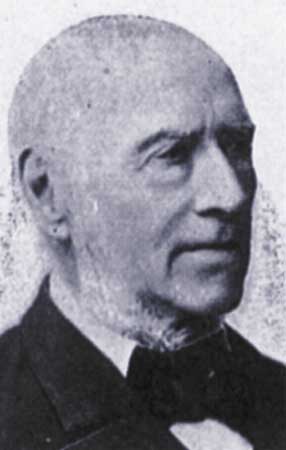August Reichensperger: Difference between revisions
→Further reading: Category:Members of the 1st Reichstag of the German Empire Category:Members of the 2nd Reichstag of the German Empire Category:Members of the 3rd Reichstag of the German Empire Category:Members of the 4th Reichstag of the German Empire Category:Members of the 5th Reichstag of the German Empire |
Corrected date of first ed. of Die christlich-germanische Baukunst to 1845. |
||
| Line 9: | Line 9: | ||
Originally of [[Liberalism|liberal]] tendencies, he developed from 1837 onwards [[ultramontane]] opinions, founded in 1852 the [[Roman Catholic Church|Catholic]] group which in 1861 took the name of the [[Centre Party (Germany)|Centre Party]] and became one of its most conspicuous orators. He died at Cologne.{{sfn|Chisholm|1911}} |
Originally of [[Liberalism|liberal]] tendencies, he developed from 1837 onwards [[ultramontane]] opinions, founded in 1852 the [[Roman Catholic Church|Catholic]] group which in 1861 took the name of the [[Centre Party (Germany)|Centre Party]] and became one of its most conspicuous orators. He died at Cologne.{{sfn|Chisholm|1911}} |
||
He published a considerable number of works on art and architecture, including ''Die christlich-germanische Baukunst'' (Trier, |
He published a considerable number of works on art and architecture, including ''Die christlich-germanische Baukunst'' (Trier, 1845, 3rd ed., 1860); ''Fingerzeige auf dem Gebiete der christlichen Kunst'' (Leipzig, 1854); and ''[[Augustus Pugin]], der Neubegründer der christlichen Kunst in England'' (Freiburg, 1877).{{sfn|Chisholm|1911}} |
||
His brother, [[Peter Reichensperger]], was also active in German politics. |
His brother, [[Peter Reichensperger]], was also active in German politics. |
||
Revision as of 14:26, 7 August 2023

August Reichensperger (22 March 1808 – 16 July 1895) was a German Catholic politician from the city of Koblenz.
Life
Reichensperger studied law and entered government service, becoming counsellor to the court of appeal (Appellationsgerichtsrat) at Cologne in 1849. He was a member of the German parliament at Frankfurt in 1848, when he attached himself to the Right, and of the Erfurt Parliament in 1850, when he voted against the Prussian-dominated union of the German states. From 1850 to 1863 he sat in the Prussian Lower House, from 1867 to 1884 in the Reichstag, and from 1879 onwards also in the Prussian Chamber of Deputies.[1]
Originally of liberal tendencies, he developed from 1837 onwards ultramontane opinions, founded in 1852 the Catholic group which in 1861 took the name of the Centre Party and became one of its most conspicuous orators. He died at Cologne.[1]
He published a considerable number of works on art and architecture, including Die christlich-germanische Baukunst (Trier, 1845, 3rd ed., 1860); Fingerzeige auf dem Gebiete der christlichen Kunst (Leipzig, 1854); and Augustus Pugin, der Neubegründer der christlichen Kunst in England (Freiburg, 1877).[1]
His brother, Peter Reichensperger, was also active in German politics.
References
- ^ a b c Chisholm 1911.
Attribution:
- This article incorporates text from a publication now in the public domain: Chisholm, Hugh, ed. (1911). "Reichensperger, August". Encyclopædia Britannica. Vol. 23 (11th ed.). Cambridge University Press. p. 49.
Further reading
- Lewis, Michael J., August Reichensperger: The Politics of the German Gothic Revival (Cambridge, Massachusetts: MIT Press, 1993)
- 1808 births
- 1895 deaths
- Members of the Frankfurt Parliament
- Centre Party (Germany) politicians
- German Roman Catholics
- Prussian politicians
- Politicians from Koblenz
- People from the Rhine Province
- Humboldt University of Berlin alumni
- University of Bonn alumni
- Heidelberg University alumni
- Members of the Prussian House of Representatives
- Members of the Reichstag of the German Empire
- Members of the 1st Reichstag of the German Empire
- Members of the 2nd Reichstag of the German Empire
- Members of the 3rd Reichstag of the German Empire
- Members of the 4th Reichstag of the German Empire
- Members of the 5th Reichstag of the German Empire
- Jurists from Rhineland-Palatinate